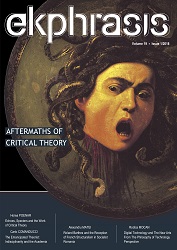Dispelling the Ideology of Immortality. Reading Kundera through Critical Theory Lenses
Dispelling the Ideology of Immortality. Reading Kundera through Critical Theory Lenses
Author(s): Adriana TeodorescuSubject(s): Language and Literature Studies
Published by: Universitatea Babeş-Bolyai, Facultatea de Teatru si Televiziune
Keywords: symbolic immortality; critical theory; the Other; deconstruction; Kundera; Sartre
Summary/Abstract: The present study aims at analysing the representations of symbolic immortality in Milan Kundera’s novel, Immortality (1999), and at assessing their potential to function as a critique of the current ways in which Western society configures immortality based on an over-pacifying principle capable of simulating/recycling an essentialist ontological dimension. The novel deconstructs symbolic immortality, denouncing all positive biases related to it and, consequently, emancipating the reader from the slavery of an ideologized immortality. Kundera’s view on immortality is determined, to a great extent, by both acknowledging the key-role of otherness in thinking and symbolically structuring immortality and revealing its culturally idealised nature, the fact that it is one of the (few) structures that still resist to postmodern criticism of sign and meaning. Kundera’s grasp of otherness is strongly influenced by Jean-Paul Sartre’s negative philosophy of the Other. Critical theory plays an important part in the general approach of this paper in the sense that it makes visible how the novel encourages an interpretation through critical theory lenses.
Journal: Ekphrasis. Images, Cinema, Theory, Media
- Issue Year: 19/2018
- Issue No: 1
- Page Range: 148-170
- Page Count: 22
- Language: English

